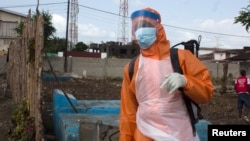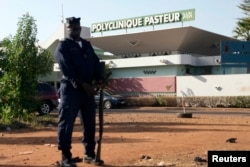More than 400 health workers involved in treating Ebola patients have gone on strike at a clinic in Sierra Leone.
The staff, who include nurses, porters and cleaners, are protesting about the government's failure to pay an agreed weekly $100 (£63) "hazard payment".
The clinic, in Bandajuma near Bo, is the only Ebola treatment center in southern Sierra Leone.
In Mali, a nurse and the patient he was treating earlier became the second and third people to die from Ebola there.
Nearly 5,000 people have been killed in the outbreak of Ebola in West Africa, mostly in Guinea, Liberia and Sierra Leone.
The World Health Organization (WHO) has declared the outbreak a global health emergency.
The Bandajuma clinic is run by medical charity MSF, which said it would be forced to close the facility if the strike continued.
MSF's emergency coordinator in Sierra Leone, Ewald Stars, told the BBC that about 60 patients had been left unattended because of the strike at the clinic in Bandajuma.
There are international staff at the clinic but they are unable to keep the clinic open on their own.
Mohamed Mbawah, a representative of the striking Sierra Leonean staff, told the BBC his colleagues had already turned away one ambulance.
The staff, who are protesting outside the clinic, say the government agreed to the "hazard payments" when the facility was established but has failed to make any payments since September.
The money was due to be paid in addition to salaries the staff receive from MSF.
Traditional healer
Earlier, the Malian authorities confirmed that a nurse and the patient he was treating at a clinic in Bamako had died.
The patient, a traditional Muslim healer in his 50s, had recently arrived from Guinea.
The current outbreak is the deadliest since Ebola was discovered in 1976
He had been treated by the nurse, 25, at the Pasteur Clinic, which has now been placed in quarantine.
The deaths are unrelated to Mali's first Ebola case, when a two-year-old girl died from the disease in October.
The new cases in Mali follow the WHO's confirmation that 25 of the 100 people who were thought to have come into contact with the two-year-old girl were being released from quarantine.
The toddler's case alarmed the authorities in Mali after it was found she had displayed symptoms whilst travelling through the country by bus, including Bamako, on her return from neighboring Guinea.
Emergency response
Ebola was first identified in Guinea in March, before it spread to neighboring Liberia and Sierra Leone. The WHO says there are now more than 13,240 confirmed, suspected and probable cases, almost all in these countries.
Cases have also emerged, though on a much smaller scale, in Nigeria, Senegal, Spain and the U.S.
Mali launched an emergency response in conjunction with the WHO when the girl's situation came to light. Her family were among those released from quarantine on Monday.
Health department spokesman Markatie Daou said around 50 people were still under observation in Kayes, western Mali, and would be released in a week if they continued to display no symptoms.
Meanwhile, the virus is continuing to spread in Sierra Leone, with almost 300 new infections recorded in the last three days.
Because of the size and seriousness of the Ebola outbreak, VOA and BBC are collaborating in order to give audiences in Africa and around the world access to the best information and content available.





